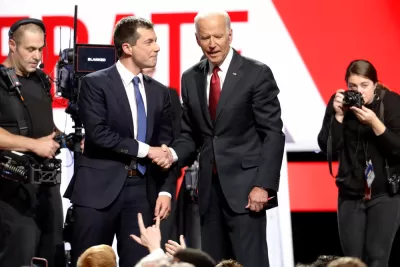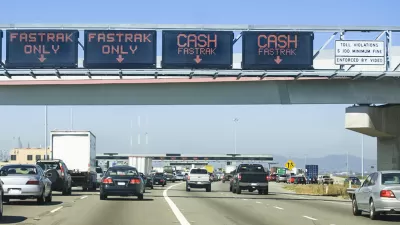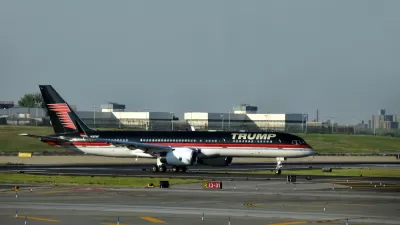Shortly after Transportation secretary-nominee Pete Buttigieg told a Senate committee that all options were on the table to pay for federal transportation investment, a spokesperson ruled out a gas tax hike.

"Buttigieg, testifying before the Senate Commerce, Science and Transportation Committee at his confirmation hearing to be secretary of Transportation, was pressed on a gas tax increase by Sen. Rick Scott, R-Fla., one of several Republicans eager to put him on the record supporting a tax hike," reports Jessica Wehrman for Roll Call on January 21.
“Would you support gas tax increases, and if so, how much?” asked Scott.
“I think all options need to be on the table,” Buttigieg replied. “As you know, the gas tax has not been increased since 1993 and it’s never been pegged to inflation, and that is one of the reasons why the current state of the Highway Trust Fund is that there’s more going out than coming in.”
In response to a question from Sen. Mike Lee, R-Utah, "Buttigieg said it was 'possible' the federal government could raise the gas tax," adds Wehrman.
“Certainly many states have taken that step, including my own, but it’s not the only approach,” he said.
Apparently, that was the statement, merely mentioning the possibility of a gas tax increase, that prompted the walk-back.
A Buttigieg spokesman later walked that statement back, telling reporters that a "variety of options need to be on the table to ensure we can invest in our highways and create jobs, but increasing the gas tax is not among them."
Buttigieg could have noted that the Indiana 10-cent per gallon gas tax hike was approved on the last day of the 1997 legislative session by a Republican-controlled legislature and signed by Republican Gov. Eric Holcomb. Unlike the federal gas tax, the legislation indexed fuel tax rates until July 1, 2024, capping the increase at one-cent-per-gallon, according to Planetizen.
Buttigieg could also have reminded the Utah senator about that his state legislature and governor agreed to a gas tax hike six years ago.
The editorial board of The Baltimore Sun expressed their disappointment with the new administration's position on the gas tax, particularly how it relates to Biden's much-touted plans to combat climate change.
It’s particularly unfortunate that President Biden has no appetite for the gas tax increase, because it’s also an effective tool in the battle against climate change. The plan he released Wednesday to achieve net zero carbon emissions by 2050 would surely be improved if Americans faced higher gasoline prices, given that the transportation sector accounts for more than one-quarter of emissions.
A look back
Biden earlier declared his presidency would not be “a third Obama term,” but in terms of transportation funding, there seems to be no change. Almost 12 years ago, just months after his confirmation, Transportation Secretary Ray LaHood ruled out hiking the gas tax. The Biden administration acted even faster to calm gas tax critics that they wouldn't tamper with fuel prices.
As The Baltimore Sun editorial concluded, "A gas tax not only deserves to be on the table, it merits a prominent seat."
Related in Planetizen:
- Indiana Legislature Passes 10-Cents Fuel Tax Hike on Final Day of Session, April 28, 2017
-
LaHood Repeats Vow: No New Fuel Taxes & No VMT Fee, Aug 3, 2010
-
Obama Rejects Gas Tax, VMT Fee, Mar 11, 2009
FULL STORY: Buttigieg cites gas tax hike at hearing, but aide walks it back

Study: Maui’s Plan to Convert Vacation Rentals to Long-Term Housing Could Cause Nearly $1 Billion Economic Loss
The plan would reduce visitor accommodation by 25,% resulting in 1,900 jobs lost.

North Texas Transit Leaders Tout Benefits of TOD for Growing Region
At a summit focused on transit-oriented development, policymakers discussed how North Texas’ expanded light rail system can serve as a tool for economic growth.

Why Should We Subsidize Public Transportation?
Many public transit agencies face financial stress due to rising costs, declining fare revenue, and declining subsidies. Transit advocates must provide a strong business case for increasing public transit funding.

How to Make US Trains Faster
Changes to boarding platforms and a switch to electric trains could improve U.S. passenger rail service without the added cost of high-speed rail.

Columbia’s Revitalized ‘Loop’ Is a Hub for Local Entrepreneurs
A focus on small businesses is helping a commercial corridor in Columbia, Missouri thrive.

Invasive Insect Threatens Minnesota’s Ash Forests
The Emerald Ash Borer is a rapidly spreading invasive pest threatening Minnesota’s ash trees, and homeowners are encouraged to plant diverse replacement species, avoid moving ash firewood, and monitor for signs of infestation.
Urban Design for Planners 1: Software Tools
This six-course series explores essential urban design concepts using open source software and equips planners with the tools they need to participate fully in the urban design process.
Planning for Universal Design
Learn the tools for implementing Universal Design in planning regulations.
Ascent Environmental
Borough of Carlisle
Institute for Housing and Urban Development Studies (IHS)
City of Grandview
Harvard GSD Executive Education
Toledo-Lucas County Plan Commissions
Salt Lake City
NYU Wagner Graduate School of Public Service




























